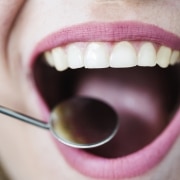Why Does My Jaw Click, Pop, and Ache?
Here’s a little experiment:
Place your fingers on the sides of your face, just ahead of your ears. Now, open and close your mouth. That movement you feel is your two temporomandibular joints (TMJ) at work! These joints connect your jaw to your skull and help you eat, talk, sing, and do anything that requires your mouth to move. Sometimes, these joints can become painful or might click or pop. Research estimates around 10 million people are affected by some sort of TMJ dysfunction—including some of our very own patients at Dental Health and Beauty in Libertyville, IL! Keep reading to learn more about this issue and what can be done about it.
Signs & Symptoms of TMJ Dysfunction
Signs and symptoms of TMJ dysfunction, which can affect one or both temporomandibular joints, may include:
- Jaw, face, and neck pain
- Stiffness or abnormal movement in the jaw (sometimes it might feel like your jaw will lock or pop out of place)
- Clicking or popping in the jaw
- Malocclusion (when the upper and lower teeth don’t line up properly)
- Tooth sensitivity without any known dental infection or dental problem
- Earaches
What Causes TMJ Dysfunction?
The temporomandibular joints are made of an elegant coordination of muscles, ligaments, tendons, bones, cartilage, and other tissues. Sometimes, any one of these tissues can become affected or impaired, leading to dysfunction in the joint.]Some of the most common causes of TMJ include:
- Slouching with a forward head or other types of poor posture that strain the neck and TMJ
- Physical trauma that affects the TMJ or jaw, such as a blow to the head or whiplash
- Teeth grinding (called bruxism) or frequent jaw clenching, which are often related to stress or other underlying health conditions
- Abnormal tooth alignment
- Growing-in wisdom teeth
- Genetic factors including a cleft palate
Sometimes, you might not know exactly what’s causing your TMJ dysfunction. Fortunately, professional treatment may still be able to help you. To help you find relief, our Libertyville dentist can offer custom mouthguards and other devices, jaw exercises, pain-relieving medications, and more. Struggling with TMJ dysfunction? Contact Dr. Nicholas Polito of Dental Health and Beauty at (847) 367-1133 to schedule a dental exam and get the solutions you deserve.







